As Louisville residents absorbed the news that their new police chief would be a white woman who resigned from her last job over the fatal police shooting of a Black Atlanta resident, Mayor Greg Fischer and his pick, Erika Shields, visited the Shawnee Boys and Girls Club for a photo opportunity.
During the half-hour visit, Fischer and Shields weaved in and out of rooms where groups of mostly Black children learned and played games. Neither Fischer nor Shields addressed those in attendance, outside of a few momentary interactions with the children. As they left the club, a trio of protestors met them, chanting, “No more photo ops.”
Earlier on Wednesday, Fischer announced that Shields, the former Atlanta police chief, would take over the Louisville Metro Police Department on Jan. 19.
She will be the fourth police chief in Louisville since the fatal shooting of Breonna Taylor in her home last March. Shield’s salary will be $210,000, according to a spokesperson for Fischer. A job posting for the position post last summer said the previous chief’s base salary was $175,102.
City leaders indicated they hope Shields will help to restore hope and trust. Several city officials and council members who served on the hiring committee spoke about Shields as a strong and unanimous choice. But, to some, her hiring represents the very issues Louisville is still struggling to address. And it didn’t take long for the questions to begin once Shields was named as the new LMPD chief.
Some wondered why the city chose her to be its top law enforcement officer, given she resigned after the killing of Rayshard Brooks, the Black motorist who was shot in June by an Atlanta officer after falling asleep in a fast food drive-thru.
In Louisville, Breonna Taylor’s death remains a source of pain and distrust.
But Shields drew a contrast between the fatal shooting of Brooks, which involved a scuffle with police, and that of Taylor, who was asleep when police arrived at her door to serve a search warrant. She said these sorts of things just don’t happen to white people. And she said Taylor was “asleep in her bed” when police arrived.
That comment prompted a response from the River City Fraternal Order of Police, which said in a statement late Wednesday that Shield’s statement threw doubt on the union’s cautious optimism about her hire. The union interpreted Shields’ comment to mean Taylor was killed in bed; in fact, police shot and killed her in her hallway as she was approaching the door.
“Mayor Fischer and Chief Shields should immediately dispel the false narratives that Breonna Taylor was sleeping in her bed when she was shot, that search warrants aren’t served and laws aren’t enforced in white neighborhoods and race plays any part in LMPD investigations,” the statement said.
Though some of Shields’ comments today have already caused police union members to distrust her, the FOP “is still willing to make every effort to work with Chief Shields to develop a strong and trusting relationship with the rank and file officers of the LMPD,” the statement said.
Members of the FOP aren’t the only ones lacking enthusiasm about Shields.
The hire struck Timothy Findley, Jr., senior pastor at the Kingdom Fellowship Christian Life Center and Founder of the Justice and Freedom Coalition, as tone deaf. He said it demonstrates a lack of empathy from city leaders as residents continue to seek healing after Taylor’s killing.
“It just reinforces what many, many people, especially in the Black community … feel regarding our leadership — that they are insensitive, and there is a real lack of empathy towards Black citizens,” Findley said.
He said city leaders are asking residents to trust their decision-making, but they haven’t done enough to earn that trust.
“I think it is the playbook and the strategy of our leaders who make these decisions and come out and say, ‘Give her a chance. Trust our decision. Trust our process. Let’s all come together,’” Findley said. “And the truth is we have to endure these bad decisions.”
He said city leadership showed they can’t “read the room.” And he said Shields’ hiring does not set the stage for community healing.
Mayor Fischer chose Shields based on the unanimous recommendation of eight hand-picked elected officials, all of whom signed non-disclosure agreements and couldn’t reveal the names of any finalists for the position.
Louisville Metro’s chief of public safety Amy Hess said candidates were concerned releasing their names would impact their reputations, credibility or current employment. She said the pool was racially diverse, and there were Black finalists.
James Peden (R-13), co-chair of the Metro Council’s public safety committee and a member of the selection panel, said he wondered whether or not the list of finalists for the position should have been secret. But he said he came around, because he believed it allowed Louisville to get the best candidates, and that the city’s pool was stronger than those in other cities where finalists were made public.
“It was the best thing for this city at this time,” Peden said.
Fischer praised Shields’ professional 25-year record with the Atlanta Police Department — and her decision to resign the day after an Atlanta officer killed Brooks.
“When tragedy happened in her city, she put her city before herself, stepping down so she would not be a distraction as their community worked to heal,” he said.
Shields also recognized a need for communities in Louisville and across the country to recover and come together after a year of traumatic police shootings of Black people. But she said she sees opportunity.
Elected officials appealed to the public to give Shields a chance to prove she can create that model.
If you appreciate access to this important content during this global pandemic, please help us continue to provide public service journalism and information to Central and Eastern Kentucky communities. Please make your contribution to WEKU today.





